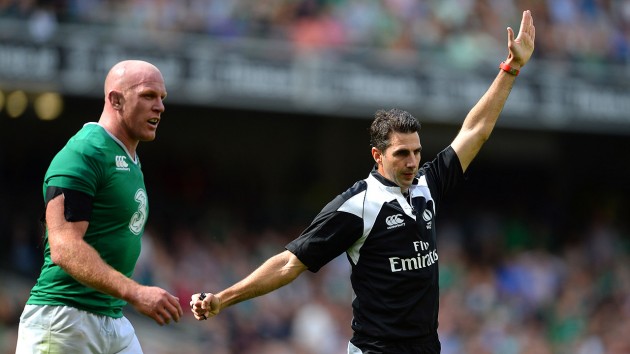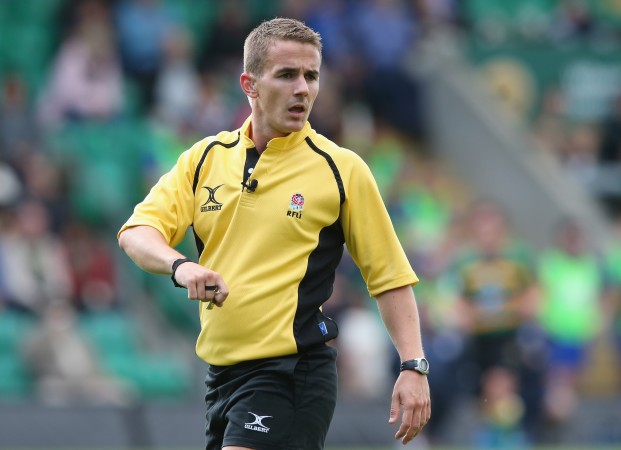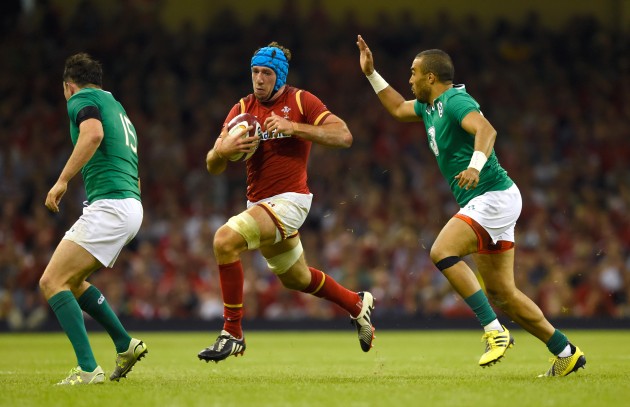At a pivotal stage of Wales' win in Dublin on Saturday, referee Craig Joubert made a contentious decision that irked both Ireland skipper Paul O'Connell and head coach Joe Schmidt. In the first of a new series, we offer up an argument for either side of the opinion-split as Charlie Morgan and Alan Dymock look at one incident from different angles.
Picture the scene: Wales and Ireland are locked at 10-10, close to the hour mark. Dublin’s Aviva Stadium is expectant. The hosts have taken a while to click into gear but are finally getting some phases together.
Mobile loosehead prop Jack McGrath takes a pass from Conor Murray and trundles over the Wales 10m line. James King drags him down. Though Justin Tipuric pounces to threaten the ball, Paul O’Connell extinguishes any danger by stooping and swinging the openside to the floor. Ireland recycle. They have some impetus at last.
Then referee Craig Joubert blows up. Touch-judge Luke Pearce has adjudged O’Connell’s clear-out to be dangerous. Joubert takes on an almost apologetic tone before mentioning the recent World Rugby directives on clean-outs around the neck and awarding a penalty to Wales.
Afterwards, Joe Schmidt clearly felt frustrated. He highlighted the call as a pivotal moment, questioning why Joubert would act on the view of a colleague “standing 50m away.”
Well, we don’t mind a bit of controversy. Take a look at the clip and then read a couple of opposing viewpoints below:
My only problem with the outcome of this episode is that fact that Luke Pearce has not received more credit.
In my view, his intervention amounts to a proactive and perceptive piece of officiating – even if he is not quite 50m away, as Joe Schmidt spikily suggested at the post-match press conference.
Any refereeing directives need decisiveness and consistency. Without such an approach, everything about them is undermined. Just look at the scrum put-in.
Every few months come vacuous calls to crack down on feeding. There has been precisely zero progress over the past five seasons. This area of the sport remains farcical and becomes more difficult to correct with every crooked feed that goes unpunished.
Lawmakers and mediators must be brave to halt the vicious circle and bring about constructive change. And you would be utterly deluded to argue that the breakdown area does not require rapid change.
The ‘crocodile roll’ technique of twisting an opponent from the tackle area is a severe threat to player safety.
Necks and knees – remember Jean de Villiers‘ hideous ligament-wrecking against Wales last season? – are placed under huge stress by a protagonist who is usually flopping to deck anyway.
This is the case with O’Connell here. The Ireland skipper is parallel to the ground by the time Justin Tipuric’s head jolts downwards.
Now, every referee has stylistic nuances and Craig Joubert tends to allow a contest at the ruck. He usually sympathises with a defender who, like Tipuric, may not quite be supporting their own bodyweight. Rugby’s laws – eternally open to interpretation.
But you cannot allow the same wiggle room with O’Connell’s clear-out. Though, as Schmidt stated, the lock initially hit Tipuric under the armpits, he ends up grappling his rival’s scrum cap by the end.
Given how catastrophic neck injuries can be, why not err on the side of caution?
Watching this in real time my initial reaction was that it was the right call, a fine save by the officials. However, after watching it over and again I realised there was room for a different interpretation, not one where O’Connell was accused of a WWE-style swinging neck-breaker, but rather a lack of supporting his own weight.
Over the last few seasons I’ve made a point of looking out for players coming off their feet at the breakdown as they steam in with the sole intention of inflicting a monstrous hit on opponents – an aspect of the modern game that is both dangerous and unlawful.
It must also be said that any efforts to protect the head and neck at the point of contact is commendable. Yet when I re-watched this incident and clocked that O’Connell came in ‘through the gate’, noticeably slowing down to make contact, I thought I should give the wily old lock the benefit of the doubt.
So I looked more closely. Now there is a checklist of things to go through here, having considered the straight entry of the Irish skipper. He slows because Tipuric is in there first, like any top openside can.
The Welshman’s initial manoeuvre places his hands on the ground in front of the fallen McGrath. O’Connell clearly dips, considering a traditional clear-out, but Tipuric is leaning on the ground, possibly about to draw his hands towards himself in an effort to grab the ball and rip.
This opens up the issue of jackling. The way ruck competition is officiated now, Tipuric could win a penalty without ever having to touch the ball. Closing it off from Ireland would be enough. Supporting his own bodyweight? It’s unlikely, but not uncommon, so O’Connell has to think fast.
Grabbing Tipuric around the waist and pulling him over, tail-first towards his own line would give the same end result of a penalty. Getting lower than a player with hands on the ground and driving him up and back is impossible.
He chooses to scoop his left arm under Tipuric and place his right arm over the top – attempting to get under the other armpit but slipping up and tucking Tipuric’s head under his own pit in the process. Smooth and graceful? Hardly. But it was the only option available to O’Connell.
Oh shucks, I thought: Big Paulie may not have looked like hurting Tipuric’s neck at all, but he still fell over the ruck, off his feet. That’s not the same no-no, but a no-no nonetheless.
Then it hit me. Tipuric wasn’t in control of his own bodyweight either. Using the ground to balance, he gained an unfair advantage.
Keep protecting players’ necks. But also be mindful of players losing balance in attempts to steal the ball. If no one puts parts of their upper body on a fallen player on the ground, chances are the risk of neck injury will fall. Tipuric was not totally innocent here.








